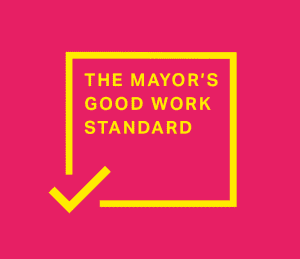Pandemic Stories Research Group make their case to APPGs

Jennifer, Policy Champion and peer researcher on the Pandemic Stories project, reflects on her experience of presenting evidence to All Party Parliamentary Groups on Universal Credit and Foodbanks.
At the same time as the Pandemic Stories team were presenting their findings, MPs were voting on the Universal Credit uplift, so they were coming and going throughout. A real taste of parliamentarian life and the challenges of trying to influence fast moving policy.
In this blog, Jennifer shares the findings, their solutions and reflects on her overall experience of what it was like to present to parliamentarians.
My name’s Jennifer. I was a peer researcher on the Pandemic Stories project, and I am now employed as a Policy Champion at Toynbee Hall.
On 9th February 2021, I presented to two APPG’s (All Party Parliamentary Groups): The APPG on Universal Credit and the APPG on Foodbanks.
My fellow peer researchers Anwar and Angela presented alongside me. They shared our research findings from the Pandemic Stories project. I am sharing a few of our key findings below:
I am sharing a few of them below:
1. People have lost income but report an increased need to spend on food, bills, and internet.
2. The shame families feel when they cannot cope financially is damaging their sense of self-worth, especially when they need to rely on charities.
3. There is strain across whole households for young private renters. With little disposable income they struggle to meet the shortfalls caused by Universal Credit.
4. There is extra financial pressure on diasporic communities due to a cultural expectation to give, and the need to support friends and family with No Recourse to Public Funds.
5. Buying internet data has been an extra financial pressure but has also allowed greater financial control for many, as they can shop and bank online and save credit on calling abroad.
I shared with the APPG members our recommendations to tackle these issues, including the need for a minimum income guarantee, so everyone can cover their essentials after housing costs. And of course, we believe the £20 increase to Universal Credit and Working Tax Credit should be extended to legacy benefits and kept for at least the duration of the economic crisis.
Presenting to the APPG was a great experience for me. The audience made me feel accepted, encouraged and quite comfortable. Although I was a bit anxious, I was able to remain calm throughout my presentation and enjoyed every moment of it. I expressed my own personal feelings, passion and experiences while completing the research.
After the presentation I sensed that there was great impact, and that people were captivated with not only our findings, but with the work we had done and how we had done it.
As I was well prepared for the presentation, I remained focused. My colleagues congratulated me and said that my speech was firm and friendly and that I handled the presentation well. This presentation highlighted some of my strengths that I did not realise I had.
I am hoping that our findings and recommendations will be taken seriously and that we can improve the mental well-being and finances of our communities. This will help us to grow together to not only depend on the government or handouts, but to be so empowered individually and in our communities so that we can make improvements and make a difference.
Finally, I will leave you with a quote from one of our research participants:





















